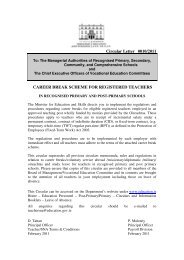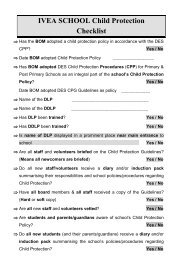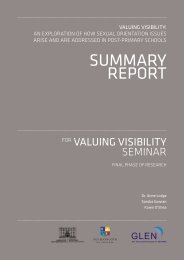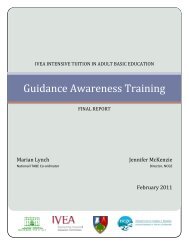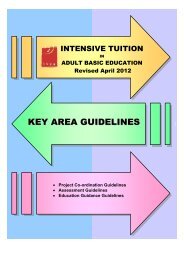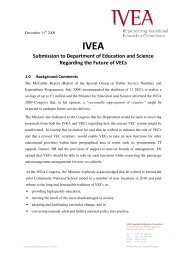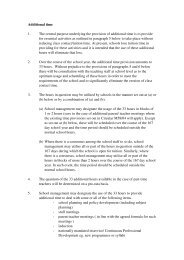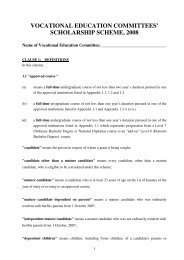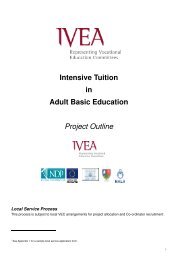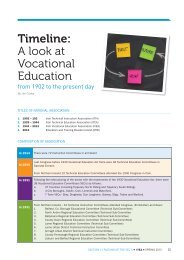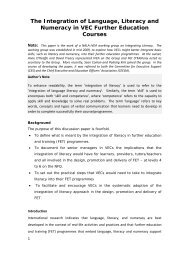Download File - IVEA
Download File - IVEA
Download File - IVEA
You also want an ePaper? Increase the reach of your titles
YUMPU automatically turns print PDFs into web optimized ePapers that Google loves.
8.2.1 Experiences of Guidance Counsellors in aPLC CollegeThe following section was supplied by Ms. Finola Butler and Mr.Paul Rudden, Guidance Counsellors at Whitehall College of FurtherEducation.Experiences of Guidance Counsellors in a PLC CollegeIntroductionThe service provided in Further Education colleges at the moment isby the guidance counsellor only with limited referral arrangements topsychologists if considered necessary and if available. The serviceinvolves primarily advice about careers and opportunities for furtherstudy as well as meeting certain counselling needs.Needs of minority linguistic studentsGeneral NeedsThese students are likely to face a huge number of difficult issuesduring their time at the college. Many issues that pose little or noproblem for Irish students are problematic for minority linguisticlearners and therefore come to the attention of class teachers andguidance counsellors (e.g. nature of accommodation; different statusof students; financial issues; accessing services such as education;and, heath and psychological issues).Language IssuesIn many situations the student in your college may be the only personin their family group to have a reasonable level of competence inEnglish. They are needed to sort out the problems of the whole family- this leads to interruption in their course work and also can meanthey look for support in the college for a wide variety of needs. Evenwith excellent English finding your way through the red tape of a newsystem can require help and support. If the level of English or writtenEnglish is weak everyday living can be problematic. Many minoritylinguistic learners in our colleges as they need either a qualification inEnglish or a local qualification and reference.Educational IssuesMany students are desperate to succeed and want to fast track.Many have degree and diploma level qualifications attained in theirown countries and we get requests to attend two courses at thesame time or to mix and match different courses. Many wish to obtainrecognition of qualifications received in their own country. The careerguidance teacher can only guide students and give them information.They don’t want to give the students false hope. Some students try touse the career guidance service as a general support and are lookingfor far more back up than the service is in a position to give. Somestudents have little knowledge of our educational system and this canbe a barrier to achieving their full potential.Cultural IssuesCultural difficulties can also make what would seem to us routinetasks into more difficult situations. Cultural differences can causeproblems; for example, it is difficult for women to remain in thesame traditional roles when living in Ireland. In interview situationsmen may do all the talking on behalf of their wife or child. Culturalissues arise during counselling. Solutions to personal problems likerelationship breakdown e.g. leaving the home or having time apart ina relationship may not even be considered as an option. They canbe reluctant to discuss their situation openly with the careerguidance teacher.Other IssuesOther more serious issues like homelessness, drugs, domesticviolence or serious psychological problems also arise. Under thepresent constraints, there are severe limitations on accommodationto meet with students on a one-to-one basis to address their issues.Providing a career guidance service to minority linguistic learnersunder the present circumstances can be very time consuming and adrain on the career guidance resources of the college.Finola Butler & Paul Rudden, Whitehall College of Further Education.8.3 SOCIAL NEEDSMinority linguistic learners can often be isolated – for a varietyof reasons. Social events/facilities are extremely important inthis context.<strong>IVEA</strong> recommends that the following social facilities be provided:• Social and exercise facilities e.g. gym facilities and other socialoutlets (as recommended by McIver report).• Access to a canteen (hot drinks, tea making facilities etc). This isan important facility for all students generally but, in the context ofminority linguistic learners, has a useful social aspect also.• Educational institutions should not expect minority linguisticlearners to automatically be familiar with all aspects of Irishculture and should consider social events as a way to sharecultures (e.g. organising musical events, food fairs etc.).33



